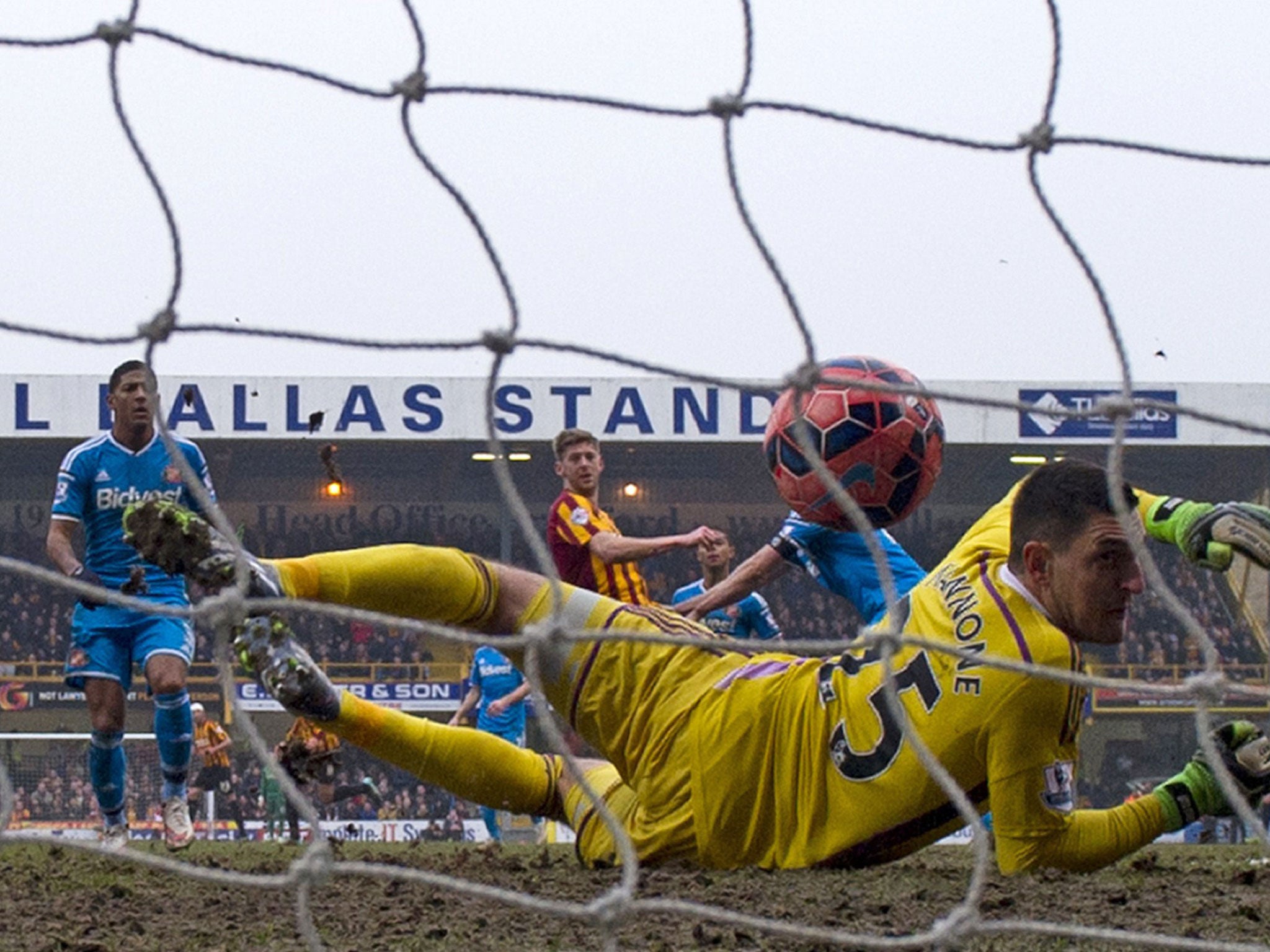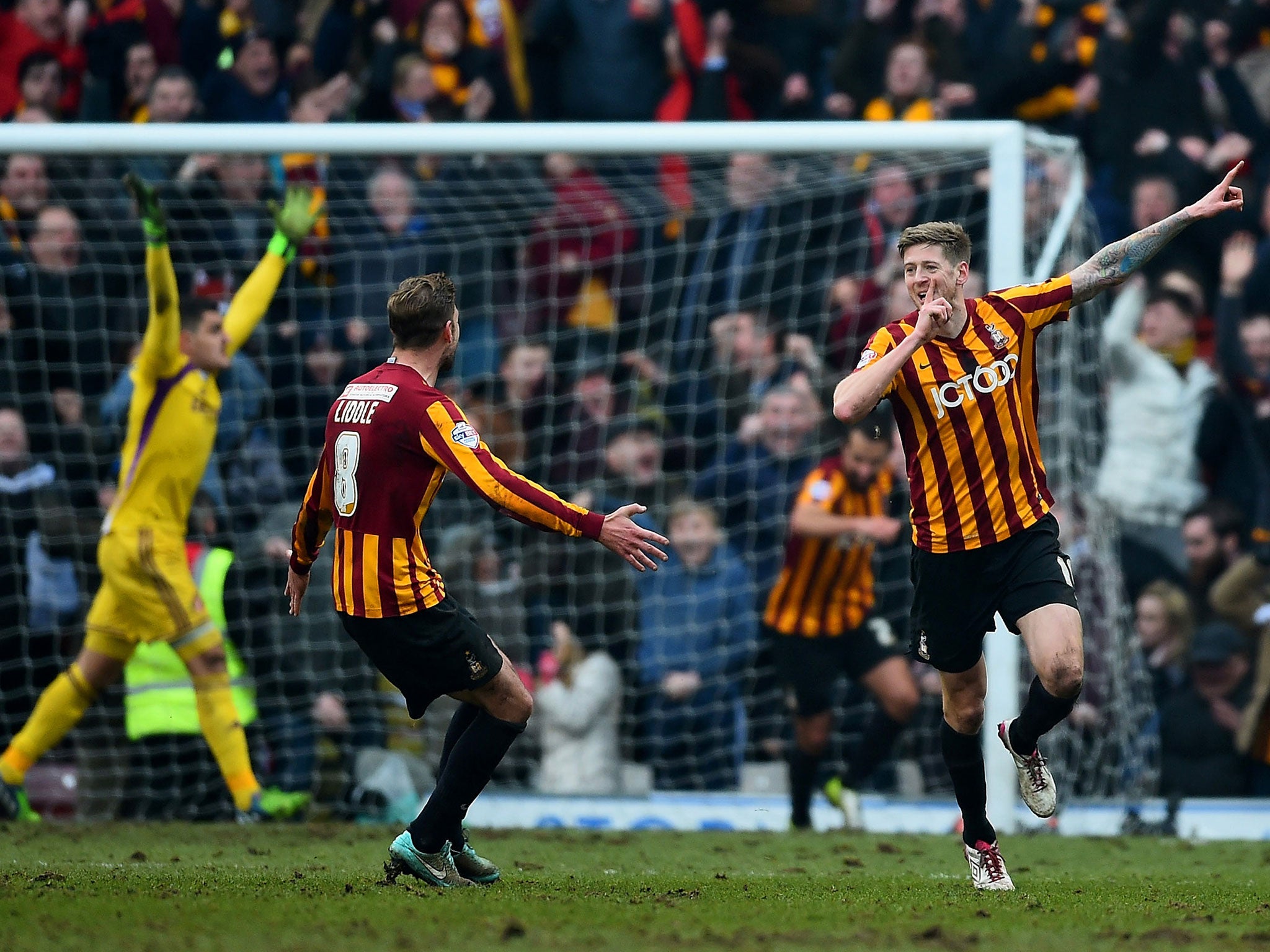Your support helps us to tell the story
From reproductive rights to climate change to Big Tech, The Independent is on the ground when the story is developing. Whether it's investigating the financials of Elon Musk's pro-Trump PAC or producing our latest documentary, 'The A Word', which shines a light on the American women fighting for reproductive rights, we know how important it is to parse out the facts from the messaging.
At such a critical moment in US history, we need reporters on the ground. Your donation allows us to keep sending journalists to speak to both sides of the story.
The Independent is trusted by Americans across the entire political spectrum. And unlike many other quality news outlets, we choose not to lock Americans out of our reporting and analysis with paywalls. We believe quality journalism should be available to everyone, paid for by those who can afford it.
Your support makes all the difference.As Bradford City’s footballers took their lap of honour, one chant kept pounding through the evening air: “Are you watching, BBC?”
Since reacquiring the rights to the competition, the BBC has banged on interminably about the magic of the FA Cup, usually accompanied by black-and-white footage of an urchin twirling a rattle above his head. That the corporation then ignored the one fifth-round match that had every element of this seems almost as worthy of condemnation as its failure to hold on to live coverage of the Open. The BBC turned its back on the FA Cup tie of its dreams.
Anger that Bradford’s 4-2 victory over Chelsea, which has as good a claim as any to be the biggest shock in the history of the competition, was not followed up by live television coverage of what proved a thrilling dismissal of Sunderland ran deep. The £247,000 fee would have written off half the deficit with which Bradford began the season and it would have given greater currency to the miracle of Stamford Bridge.
Match of the Day presenter Gary Lineker insisted on Twitter last night that the BBC would have screened the game had Bradford’s opponents been known before the fourth-round replays.
In beating Sunderland, Bradford would have to take their payment in something more lasting than money. The current FA Cup was made in Bradford in 1911 and few teams have embellished it like this.
When Colchester United overturned Don Revie’s Leeds in 1971, they were thrashed 5-0 by Everton in the next round. Wrexham followed up their defeat of Arsenal in 1992 by being knocked out by West Ham after a replay. The astonishing aspect of Bradford’s story is that they have kept on killing their giants.
Their manager, Phil Parkinson, has now beaten five Premier League teams in the League and FA Cups. This was one of the easier victories.
It was a tie that had mud, blood (Rory McArdle and Danny Graham played most of the match with bandaged, bloodsoaked heads) and glory. As a contest, it crackled long before kick-off.
Except for one end, where the T L Dallas Stand looks like something they might have built in J R Ewing’s home town had oil never been discovered in Texas, Valley Parade has the appearance, if not of a Premier League ground then a good Championship one. Nevertheless, it is run by a skeleton staff and volunteers had been out at 8.0am yesterday laying down the placards that before kick-off would transform Bradford’s steepling Kop into a wall of claret and amber.
It would take three minutes for the background noise to explode. If the stadium he plays in is not a standard League One venue, then the crosses sent in by Filipe Morais, who was brought to Chelsea under Jose Mourinho and scored the equaliser at Stamford Bridge, were also from a rather higher plane.
The Portuguese winger’s first free-kick was brought under control by Billy Clarke, who had played Under-21 football for Ireland. His shot struck another Irishman, John O’Shea, and left Vito Mannone stranded on his churned-up goal-line.
With Bradford having scored four at Chelsea, and having eliminated Arsenal and Aston Villa in their astonishing run to the League Cup final two years ago, you wondered how much of a shadow these giants from Wearside really cast in their eyes. Their main enemy until Stead scored the decisive second was their own growing exhaustion.
There was, however, one moment in the first half when Sunderland might have regained control of the game. Sebastian Larsson scuffed his shot from the edge of the area but the ball came straight to the boots of Steven Fletcher, who dithered for an age over his shot before being tackled by McArdle.
Sunderland were convinced it was a penalty but what Gus Poyet ought to have wondered is why Fletcher, a Scotland international employed at vast expense as a Premier League centre-forward, appeared so surprised that he might have to shoot.
For Poyet, this defeat might be something of a watershed in his time as Sunderland manager. As the game drained away and Sunderland became ever less competitive, the travelling fans began chanting out the first serious show of dissent he has faced since inheriting the chaos left behind by Paolo Di Canio in 2013.

The Sunderland fans did, however, applaud Bradford as they conducted their lap of honour and they applauded Stead when the striker was substituted. He had played for Sunderland under Mick McCarthy and was not alone in failing to make an impact in that time. He had tried, however, and on Wearside effort goes a long way.
His goal came from nowhere. As the hour mark approached, Bradford looked spent with every throw-in fervently cheered by a crowd who would be making ever more frequent glances towards the elderly electronic clock.
However, the home side kept harrying and, under pressure from James Meredith in his own area, Adam Johnson made a hash of his clearance. Hanson headed the ball down to Stead, whose shot squirmed under Mannone’s body.
His goal meant he had scored in every round of this season’s FA Cup. He could not have imagined where the first, at Halifax, would take him.

Join our commenting forum
Join thought-provoking conversations, follow other Independent readers and see their replies
Comments